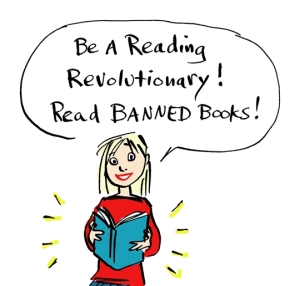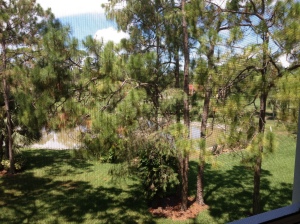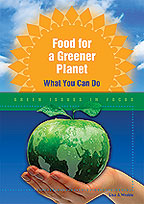“I do not believe that any book should be denied to the man who possesses the wisdom to understand it, Bruno, but that does not mean I am confused about where truth lies.”
~S.J. Parris, Heresy
The summer I turned 11 was a turning point for me. As an author who opposes censorship and advocates for our many freedoms, that summer is etched in my mind. It was the summer my mother trusted my decisions. It was the summer I experienced the positive outcome of a freedom to read what I chose. It was the summer that had a lasting impact on my life, values, and beliefs.
As we prepared to enter middle school, my friends all opted for a big summer camp finale which left me to a long and boring summer alone. Having read all my library books, I rummaged through the basement in search of books or games cast off by my sisters. They were 6, 8, and 11 years older. I found several that looked promising, but one was especially intriguing. When Debbie Dared. The hardback book had no dust jacket so there was no book summary. I read a few pages, as the school librarian had taught us, and it seemed interesting. A girl moves during the summer and hopes to make a few friends before she begins Jr. High.
 I took the book to my mother. “Is it okay for me to read this?” I asked.
I took the book to my mother. “Is it okay for me to read this?” I asked.
She was preparing a cup of tea, something she’d done at this time of afternoon—our former nap time—for decades though we were all long out of preschool. Glancing at the book she said, “Looks like it belonged to one of your sisters.”
I nodded. “Found it in the basement. It’s called When Debbie Dared.” I paused. No reaction. “So, can I read it?”
She studied me for a moment and took a sip of tea. “Why couldn’t you? Did you read a few pages?”
“Yes. The girl in the story is a little older, going into Jr. High. What’s Jr. High?”
“It’s similar to middle school. Jr. High included grades 7-9. Grade 6 was still in elementary.” I wrinkled my nose thinking that I’d still be in elementary next year with this set-up. “Your eldest two sisters went to Jr. High, but then they restructured the grades.”
I thought about that and looked at the book, wondering what Debbie dares doing?
Mom calmly watched me, sipping her tea and unwinding. “So tell me, why do you think you shouldn’t read it?”
“Well, the title—When Debbie Dared. There’s no summary.” I showed her the blank back of the book. “I don’t really know what it’s about.”
“What do you think it’s about?”
I shrugged.
“What do you think the ‘dare’ is about?”
My throat tightened. Again I shrugged. “I don’t know. Do you remember?”
Mom laughed. “Honey, I probably never read that book. If I did, or if your sisters told me about it, it was so long ago, I don’t recall.” She patted my hand. “What do you think? Why are you worried about this?”
“I don’t know. What if . . . what if it’s about . . . about dating or . . . or sex?”

illustration by Stephanie Piro
I could tell this was something she hadn’t considered. But, in hindsight, how would my sisters have read a book about such things? The book had to be about a decade old, give or take a few years.
“I see,” Mom said, then sipped her tea. “Why don’t we do this? You read the book and if you get to any parts where you think you shouldn’t read it, then stop. Or, if you get to parts you don’t understand, bring it to me and we can read it together and talk about it.”
“Really?”
“Really.” She patted my hand and I ran off to read, my conscience greatly unburdened.
During the next day or so I read and gave her the plot summary. Sure, the story was outdated but I enjoyed it. It turned out the big decision Debbie needed to make was about shoplifting. She wanted friends before school started and two popular girls befriended her. But, to prove her loyalty to them, she was supposed to steal a bracelet from a jewelry store in town. She agonized over it, but in the end stood up to her so-called friends.
Later Mom noticed I was sprawled on the couch reading a different book. “Did you get to a part in the other book and stop reading?”
“No. Finished it.”
“So, what was Debbie’s dare?”
“Shoplifting a bracelet. She didn’t.”
Mom moved my legs to make room for herself on the couch. “So, do you plan to shoplift now?”
I put my book down and scoffed. “No. Debbie stood up to her friend. I liked that. Now I know how I could do the same thing if someone tries to get me to do something I don’t want to do.”
Mom patted my leg as she got up. “You know, you can always come to me if you don’t understand something you read, or hear, or see somewhere.”
“I know. Thanks, Mom.” She kissed my forehead. “That title was pretty unfair, though. It wasn’t what I expected at all.”
She smiled. “But it got you to read it, didn’t it?”
She was right. And I learned something from that book that stayed with me until this day. And, itt did help me say “no” when pressured to smoke cigarettes or try drugs or whatever. And if my friends didn’t respect that, then I knew they weren’t really my friends.

quote by ALA President Roberta Stevens
Most importantly, because my mother was brave enough to allow me to read that book—when neither of us knew what it was about—she gave me an opportunity to learn and to grow. She trusted me to choose. What if she had denied me that right? Worse, what if someone else—a stranger somewhere—had made that decision for me? And that’s why I advocate against censorship, against taking away such a right. We have no idea how and when our fellow readers are ready to deal with the ideas presented through the intellectual property of authors. Everyone should have the right to choose his or her own reading material. Stand up for this right.
Yes, children are impressionable but their parents—not any other parents or teachers or adults—are responsible for monitoring their child’s reading material. This idea is supported by the “Library Bill of Rights” (the American Library Association’s basic policy concerning access to information) which states that:
“Librarians and governing bodies should maintain that parents—and only parents—have the right and the responsibility to restrict the access of their children—and only their children—to library resources.” Censorship by librarians of constitutionally protected speech, whether for protection or for any other reason, violates the First Amendment.
Censorship by anybody, violates the First Amendment.
To learn more about challenged and banned books, visit the American Library Association’s Office of Intellectual Freedom page.




 At some point in our development as writers, we compare ourselves to other writers and our confidence suffers. I see it written across the faces of students after someone shares beautifully written prose in writing classes. From their expressions I can almost hear the negative self-talk broadcasting in their minds of the other participants. “Well forget reading today; I’m not going to follow that” or “It took me hours to get this chapter just perfect and it stinks” or “I knew I would have felt a better sense of accomplishment if I cleaned the shower yesterday instead of working on this writing assignment.”
At some point in our development as writers, we compare ourselves to other writers and our confidence suffers. I see it written across the faces of students after someone shares beautifully written prose in writing classes. From their expressions I can almost hear the negative self-talk broadcasting in their minds of the other participants. “Well forget reading today; I’m not going to follow that” or “It took me hours to get this chapter just perfect and it stinks” or “I knew I would have felt a better sense of accomplishment if I cleaned the shower yesterday instead of working on this writing assignment.”





















